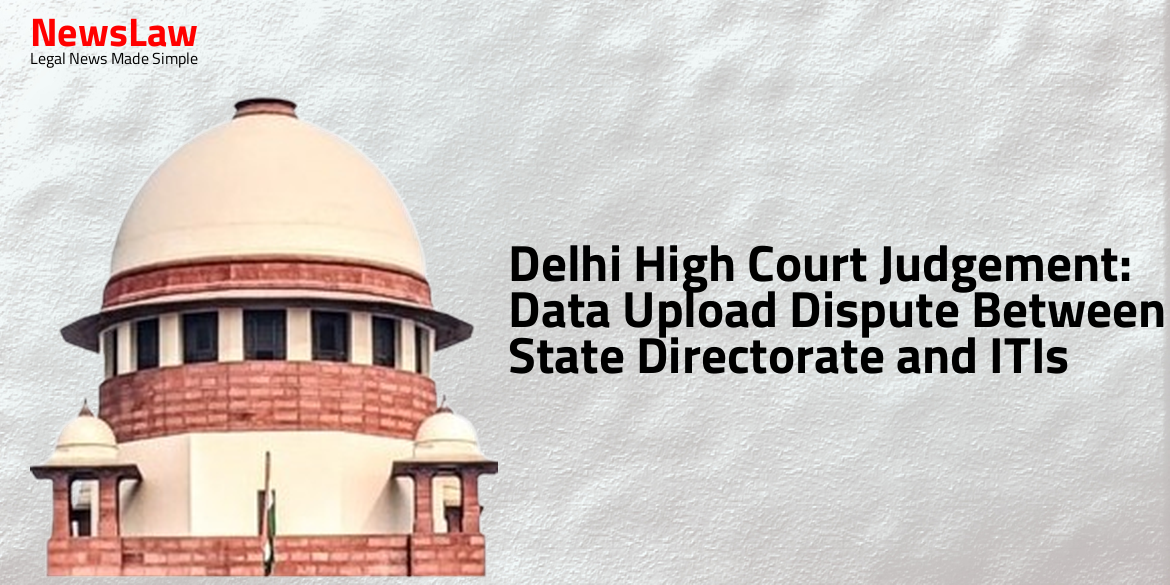Explore the judicial scrutiny of the MACP Scheme implementation, focusing on the legal analysis and considerations put forth by the court. The blog sheds light on the intricate details of the scheme, emphasizing the court’s perspective on the matter.
Facts
- The appellant, UOI, filed appeals due to being aggrieved by the decisions of various High Courts following Raj Pal and Ved Prakash’s case in granting relief to the respondents.
- The High Courts upheld decisions of different Benches of Central Administrative Tribunal granting financial upgradation of grade pay based on Union of India and others v. Raj Pal and another case.
- The batch of appeals questions whether the MACP Scheme entitles financial upgradation to the next grade pay or to the grade pay of the next promotional hierarchy.
- Under the Sixth Pay Commission, respondents can claim only the immediate next higher Grade Pay and not the Grade Pay in the next promotional hierarchy.
- Isolated posts in Group ‘A’, ‘B’, ‘C’, and ‘D’ cadres without promotional avenues qualify for benefits under the ACP Scheme.
- Two financial upgradations under the ACP Scheme are granted to Group ‘B’, ‘C’, and ‘D’ employees after 12 and 24 years of regular service to address stagnation in a cadre or isolated post.
Also Read: Jurisdiction of Family Court in Cases under Muslim Women’s Protection Act
Issue
- Whether MACP Scheme envisages grant of financial upgradation in Grade Pay Hierarchy and not in promotional hierarchy?
- Whether MACP scheme is disadvantageous to the employees in comparison to ACP scheme as long as the financial upgradation is granted in hierarchy of grade pay under MACP scheme?
- Whether respondents are entitled to stepping up of their grade pay to be at par with grade pay of their juniors who were getting the higher grade pay on account of implementation of MACP Scheme?
Also Read: Land Acquisition Valuation and Development Deductions
Arguments
- AMICUS submitted that MACP scheme should grant financial upgradation to the grade pay of the next promotional post, not to the next grade pay in the Schedule I to the CCS (Revision of Pay) Rules.
- Respondents highlighted that due to MACP, they were placed in a lower grade pay compared to what they would have been under the ACP scheme, causing discrimination and financial hardship.
- Government introduced ACP scheme in 1999 to address stagnation issues faced by employees, while MACP scheme was introduced in 2009 with similar objectives.
- AMICUS argued that financial upgradation under ACP and MACP schemes involve fixation of pay and allowances, forming the basis for the rest of the employee’s career, and cannot be altered at the employer’s will.
- Comparison between ACP and MACP schemes shows that under ACP, employees are entitled to pay in the next promotional post’s pay scale, while under MACP, they are placed in the next immediate higher grade pay.
- ASG emphasized that Government schemes like MACP should not be discriminatory or arbitrary, and Court should not interfere as long as they are in line with the Constitution.
- Sixth Central Pay Commission recommended modifications to the ACP scheme to address disparities and ensure benefits to all employees, leading to the adoption of MACP scheme.
- Experts recommended MACP Scheme to resolve inter-departmental disparities in promotional hierarchies and to prevent anomalies like employees stagnating for long periods.
- Respondents argue for a ‘purposive interpretation’ of ‘immediate next higher Grade Pay’ as ‘Grade Pay of the next promotional post’.
- The MACP Scheme focuses on placement in the immediate next higher Grade Pay.
- The High Court in Raj Pal’s case upheld entitlement to financial upgradation based on the next promotional hierarchy.
- Respondents, if successful, would receive higher pay without assuming additional responsibilities of a promotee.
- Clauses of the MACP Scheme, including financial upgradation in the next Grade Pay, remain unchallenged by the respondents.
- The term ‘Grade Pay in the next promotional post’ is absent in the MACP Scheme, argued to prevent employee disadvantage.
- MACP Scheme offers advantages over the ACP Scheme, providing more frequent financial upgradations and higher pay bands.
- Respondents cannot select beneficial features from both ACP and MACP Schemes.
- The main objective of the MACP Scheme is to address stagnation issues.
- Arguments by respondents about the promotional post benefits under the MACP Scheme are deemed inconsistent with the Scheme.
- Anomalies in the implementation of MACP have been noted by the Joint Committee, indicating disadvantages to government servants.
- The MACP Scheme aims to incentivize employees to work efficiently even without immediate promotions.
Also Read: Legal Analysis: Ensuring Compliance in Contempt Proceedings
Analysis
- The MACP Scheme allows for financial upgradation to the immediate next higher grade pay in the hierarchy of recommended pay bands and grade pay.
- The MACP Scheme was introduced to address disparities within employees in different organizations who were directly recruited in the same pay scale but received different upgradations under the ACP Scheme.
- The MACP Scheme is a continuation of the ACP Scheme, but with certain modifications to ensure uniform benefits for all employees.
- Financial upgradations under the ACP Scheme are personal and do not require actual functional promotion or creation of new posts.
- The decision to transition from the ACP Scheme to the MACP Scheme was a well-deliberated move based on the recommendations of the Sixth Central Pay Commission.
- The MACP Scheme is intended to promote efficiency in departmental functioning by providing non-functional financial upgradations.
- The dismissal of a case by the Supreme Court on grounds of delay in filing does not serve as a binding precedent unless specific reasons are provided.
- The financial upgradations under the MACP Scheme are in the next higher grade pay, not necessarily corresponding to the promotional hierarchy.
- The MACP Scheme has stringent criteria, such as a ‘Good’ benchmark for upgradations up to a certain grade pay level.
- The introduction of the MACP Scheme aimed to mitigate stagnation issues and provide a fair system of career progression for all employees.
- Dismissal of a special leave petition in limine by a non-speaking order does not imply rejection of the merits of the case by the Supreme Court.
- Courts should exercise restraint in matters concerning pay scales and incentives, interfering only in cases of patently irrational, unjust, or prejudicial decisions by the Government.
- Decisions of expert bodies like the Pay Commission are generally not subject to judicial review due to the complexity of pay fixation processes.
- Government has the right to frame policies for efficiency and administration, with tribunals not being able to subistitute their views for the government’s.
- Fixation of pay and determination of responsibilities is a complex matter left for the executive to decide, with the Pay Commission as the proper authority on the issue.
- Dismissal of a special leave petition by a non-speaking order does not constitute a law declared by the Supreme Court under Article 141 of the Constitution.
- Equal pay for equal work is not a fundamental right but a constitutional goal to be achieved by the Government.
- Interference with prescribed pay scales is a serious matter to be handled with caution, with the Pay Commission being the proper authority to decide on such issues.
- The High Courts erred in interfering with the government’s policy of accepting the recommendations of the Sixth Central Pay Commission without considering the advantages in the MACP Scheme.
- There is no evidence to show that the MACP Scheme is arbitrary or unjust, warranting interference.
- Reliance placed solely on Raj Pal’s case for interfering with the government’s policy is unjustified.
- The impugned orders are unsustainable and should be set aside.
Decision
- All impugned orders in the batch of appeals mentioned are set aside and appeals by Union of India are allowed.
- No costs are awarded.
- Anomalies in the implementation of the MACP Scheme have been highlighted and are to be considered by the Joint Committee for appropriate decision in accordance with the law.
Case Title: UNION OF INDIA Vs. M.V. MOHANAN NAIR (2020 INSC 281)
Case Number: C.A. No.-002016-002016 / 2020



